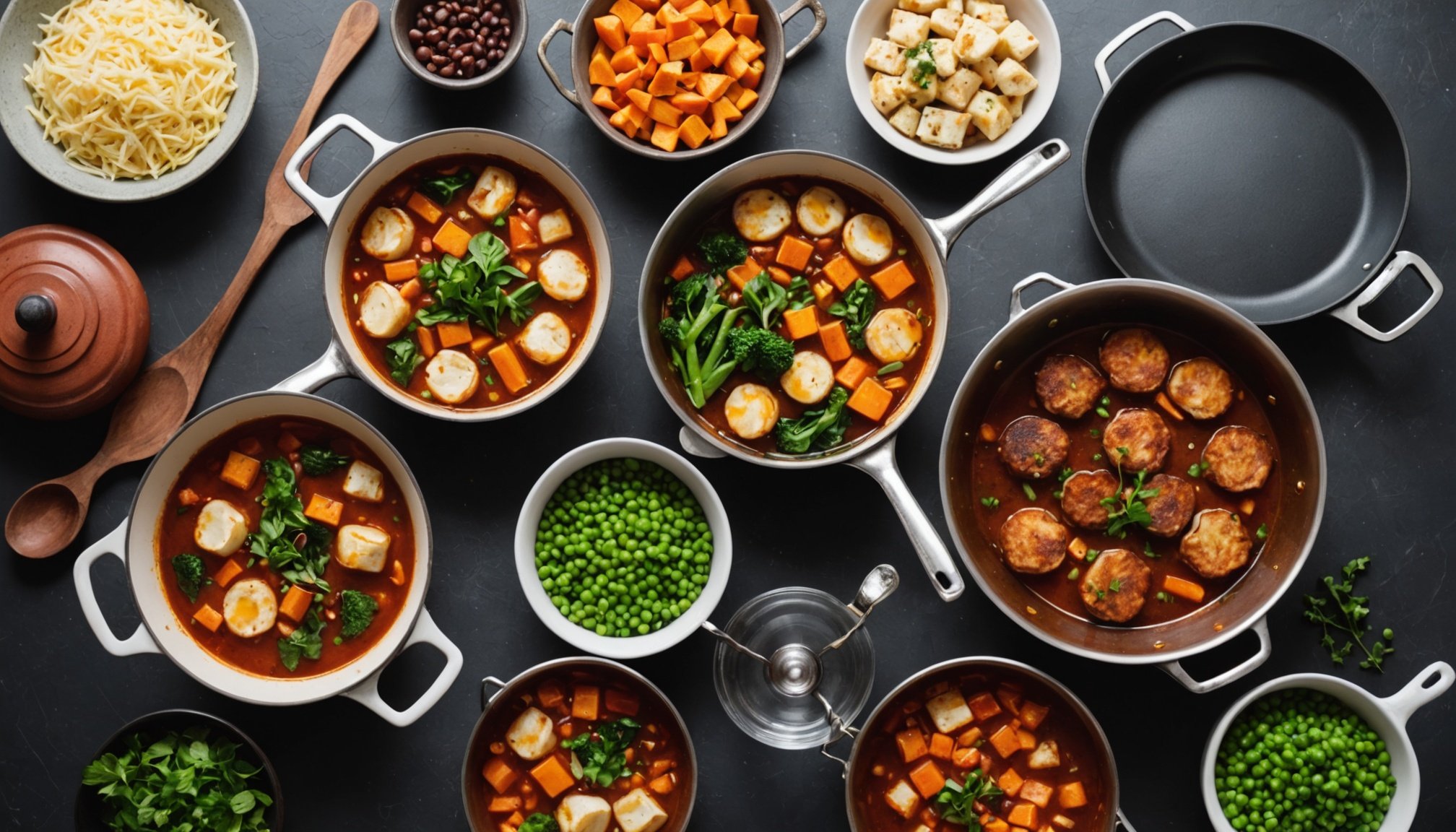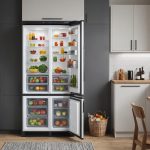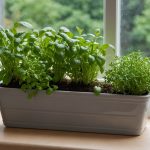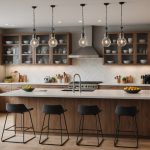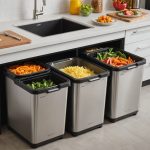Overview of Heat-Resistant Countertop Materials
In today’s kitchens, where style meets functionality, choosing the right heat-resistant materials for countertops is crucial. These countertop options not only enhance the kitchen’s aesthetic but also ensure durability and safety.
The importance of heat resistance in kitchen countertops cannot be overstated. From hot pots straight off the stove to accidental spills of scalding liquids, the kitchen surface needs to withstand high temperatures. Materials like granite, quartz, and stainless steel are increasingly popular for their exceptional heat resilience. They offer peace of mind by preventing heat damage and prolonging the countertop’s life.
Topic to read : Essential innovative features to look for in your next smart refrigerator
Though traditional choices like granite still have their place, newer trends are leaning towards quartz and engineered stone. These kitchen surfaces not only offer unparalleled heat resistance but also bring added benefits like stain resistance and easy maintenance. Polished concrete is another emerging trend, combining industrial chic with the practical benefits of heat tolerance.
With a wide array of countertop options available, incorporating modern trends while prioritizing heat resistance ultimately guides homeowners to make informed decisions for a functional and stylish kitchen.
Topic to read : Window sill wonders: your ultimate guide to growing a thriving herb garden in miniature greens
Granite Countertops
Granite countertops are celebrated for their durability and long-lasting appeal, making them a popular choice for many homeowners. Granite’s natural composition contributes to its impressive heat resistance. This makes it ideal for kitchens where high temperatures are common. The stone can withstand direct heat from pots and pans without damage, ensuring a functional and enduring surface.
Beyond its practicality, granite offers an array of aesthetic benefits. Available in a wide variety of colours and patterns, granite effortlessly complements diverse kitchen styles. Its unique appearance adds a touch of elegance and luxury, enhancing the overall appeal of any home.
Maintenance of granite countertops is straightforward, although it requires regular care to maintain their luster and longevity. Routine sealing can effectively protect granite’s porous surface from stains and etching. Cleaning with mild soap and water ensures it remains pristine, while avoiding harsh chemicals preserves its natural beauty.
Overall, by balancing beauty with functionality, granite countertops meet both practical and aesthetic needs. Their enduring appeal and ease of maintenance make them a wise investment for any homeowner seeking a stylish and reliable kitchen surface.
Quartz Countertops
Quartz countertops have gained popularity due to their heat resistance and stylish aesthetic. Unlike natural stones, quartz is engineered, giving it excellent heat resistance. This protects the surface from hot pans or pots placed directly on it. However, while it’s heat resistant, constant exposure to high temperatures may damage the resin, so trivets are recommended.
The customization opportunities with quartz countertops are vast, allowing homeowners to choose from a wide range of colours, patterns, and finishes. This makes it easy to match the countertops with various kitchen or bathroom styles, adding elegance and personal flair to any space. Furthermore, the adaptability of quartz can help in achieving specific design goals effortlessly.
When it comes to maintenance tips, quartz countertops are known for being low maintenance. Their non-porous surface makes cleaning simple and quick. A mild soap with water is often sufficient for daily cleaning, reducing the time and effort typically required.
For a comparative cost analysis, quartz offers excellent value for money. While the initial investment might be higher than other materials, its durability and ease of maintenance often make it a cost-effective choice over time.
Solid Surface Countertops
Solid surface countertops are a popular choice for modern kitchens due to their versatility and seamless appearance. These materials offer a good balance of aesthetic appeal and functionality, making them an ideal choice for homeowners. One noteworthy feature of solid surfaces is their moderate heat resistance. While they can handle average kitchen activities, exposure to extreme temperatures should be avoided to prevent damage. Therefore, using trivets or pads for hot pans is highly advisable.
In terms of advantages, solid surface countertops are non-porous, making them resistant to spills and stains, which is highly beneficial for easy cleaning. Unlike other materials, their seamless joints and integrated sink options provide a continuous flow that enhances kitchen aesthetics. However, they are prone to scratches and dents, which is a consideration for heavy-duty kitchens.
When it comes to solid surface care, regular cleaning with mild soap and water is recommended. To maintain their pristine look, avoid abrasive cleaners and periodically buff them to remove minor scratches. Following these simple maintenance steps can significantly prolong the lifespan of your solid surface countertops, ensuring they remain in excellent condition for years to come.
Other Heat-Resistant Options
For those considering alternative materials beyond the usual choices, there are several intriguing heat-resistant materials worth exploring. While concrete and marble might not immediately come to mind when considering niche countertop materials, they present unique benefits.
Customizable and durable, concrete countertops add a modern, industrial charm. They withstand heat well and can be tailored in terms of colour and texture, offering a truly** unique surface**. Although they may initially require a higher investment, their longevity can offset costs over time.
Marble stands out with its natural beauty and elegance. It’s a timeless option but does demand more maintenance. Its heat-resistant nature makes it suitable for niche applications such as fireplace surrounds, where the aesthetic value is as essential as the material’s durability.
When comparing these materials, consider performance and costs. Concrete offers a robust and heat-resistant solution with moderate upkeep, while marble delivers grandeur and sophistication but at a higher maintenance level. Each provides distinct aesthetic and practical advantages, perfect for those aiming to integrate both style and function into their spaces. Using the right material will ensure a balance between beauty and usability, fostering both utility and satisfaction.
Tips for Choosing the Right Material
Selecting the perfect material for your kitchen countertops can be a complex process, but it’s an important decision. A key factor in material selection is its resistance to heat, especially for those who frequently cook. Materials like quartz and granite are excellent options due to their durability and ability to withstand high temperatures.
Balancing aesthetics with functionality is another essential aspect of the countertop buying guide. For a more modern look, consider materials like stainless steel or polished concrete. However, it is crucial to ensure that your chosen material complements your kitchen’s overall style and functionality.
When it comes to budgeting tips for your kitchen renovation projects, it’s vital to weigh the decision factors carefully. High-end materials like marble offer a luxurious feel but can be more costly. Laminate provides a budget-friendly alternative without compromising style.
Ultimately, understanding your priorities and researching materials thoroughly can lead to a kitchen countertop that not only fits your aesthetic vision but also meets your practical needs.
Care and Maintenance of Heat-Resistant Countertops
Proper countertop maintenance is essential to preserve both functionality and appearance. Understanding the general care guidelines for maintaining heat resistance can protect your countertops for years.
General Care Guidelines
First, it’s crucial to use trivets or heat pads under hot pots and pans to prevent thermal shock. While many countertops are designed to resist heat, prolonged exposure can damage the surface. Regular cleaning with mild soap and warm water prevents build-up, while a soft cloth ensures no abrasive damage.
Specific Care Tips for Different Materials
Granite countertops appreciate sealing routines. A good sealant repels stains and improves resistance. In contrast, quartz countertops require minimal maintenance but avoid harsh chemicals or high pH cleaners which can affect the resin bonds.
Common Mistakes to Avoid
Avoid placing heavy objects near the edges as this can lead to cracks, a common mistake in countertop maintenance. Do not cut directly on the surface as this risks scratches and dulling over time. Being aware of these actions ensures your countertops remain both beautiful and durable. Regular maintenance and mindful use play critical roles in countertop longevity.
Frequently Asked Questions (FAQ)
Navigating through the landscape of countertops can be overwhelming, leaving many with common concerns. A popular inquiry relates to heat-resistant materials. Are all countertops these days built to withstand high temperatures? While several materials boast robust heat-resistant properties, it is crucial to know that not all materials perform equally under heat. Natural stones such as granite and quartz are often praised for their resilience against heat, making them ideal for busy kitchens.
Sometimes there are misconceptions regarding the durability of certain countertops. It’s important to assess how different materials stand up over time with daily wear and tear. For instance, while laminate countertops may offer an attractive price, their resistance to scratches and stains may not match that of more durable options like granite or quartz.
When choosing the perfect countertop material, consider your kitchen’s specific usage. Would frequent baking or cooking sessions benefit from the advantages of heat-resistant materials? Or perhaps a family-friendly option is better suited, requiring enhanced durability. Tailoring your choice based on usage scenarios helps improve satisfaction in the long run. By addressing these common FAQs, you can make more informed choices tailored to your needs.

